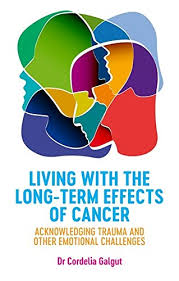Living with the long-term effects of cancer
9 November 2020
It’s often really hard for people who have had cancer to accept, and talk about, the longer-term effects of the disease and its treatment.
In many ways this is a taboo subject - the medical profession, friends and family usually expect the person who has been treated to be ‘grateful’ about the ‘ success’ of the treatment and to return to their normal life.
Yet psychologist Cordelia Galgut points out in her book, Living with the Long-term Effects of Cancer, that life after cancer is often extremely challenging psychologically and physically.
 The book is written for both people who have, or have had, cancer, as well as their families and friends, and for health professionals.
The book is written for both people who have, or have had, cancer, as well as their families and friends, and for health professionals.
Galgut herself has had breast cancer and knows from her personal experience that it is not always easy to ‘move on’ after treatment. After her initial surgery and treatment she had four years of chemotherapy to improve her immune system. Many people who have had cancer continue to take powerful medications for years after the initial treatment.
Often the side effects of post-treatment medication can be serious and then there is the continuing psychological challenges of having been treated for cancer.
One of the main sources of psychological stress is the knowledge that the cancer may return. As Calgut points out, “It is fairly impossible to ‘get over’ cancer when, for most of us, we know it can return at any point.”
This anxiety is made worse when doctors or other health professional give the impression that there is something wrong with the individual who has not been able to ‘move on’. Then the individual may question their own responses and feel judged.
In fact, there is also the self-judgment as well as the judgment of others. Most of us have been conditioned by our culture and families to put on a brave face when in pain, to look for the positives etc.
Feeling vulnerable and scared and then being told, effectively, that we are over reacting is almost guaranteed to make us feel worse.
Calgut says: “People think we should just be grateful. It is often much easier to keep quiet, especially given how conflicted many of us will feel about speaking out, since we will probably be fighting our conditioned responses telling us to ‘keep quiet’ and to ‘think ourselves lucky’.”
The author’s message is that there needs to be greater acceptance and recognition of the long-term effects of cancer, both physical and psychological. She would like more information to be given to people with cancer about the possible longer-term effects of treatment and for more research to be carried out in the subject.
Galgut, Cordelia, 2020, Living with the Long-term Effects of Cancer, Jessica Kingsley Publishers, London.


